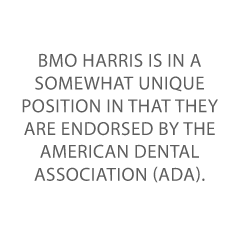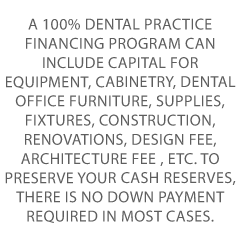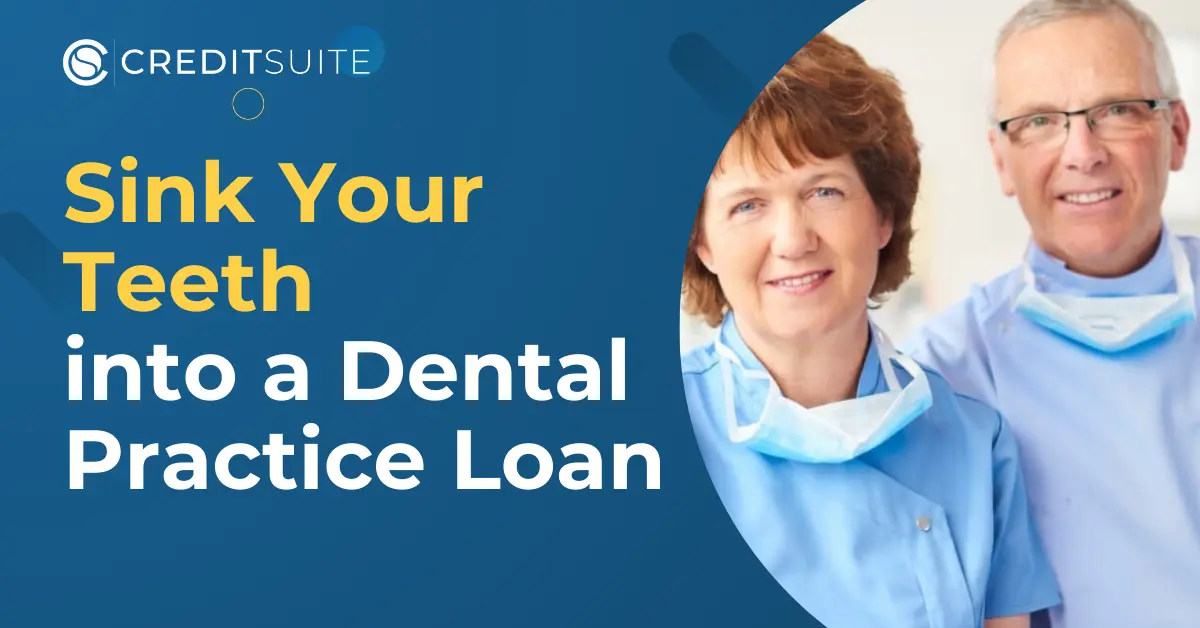Dentists have a significant startup and buy-in costs. Whether they are starting a new practice or buying into an older one as a partner, costs are high. For many, a dental practice loan is the best way to afford the costs of getting up to speed while maintaining good cash flow.
What is a Dental Practice Loan?
A dental practice loan refers to business loans that meet the needs of new dental school graduates and practicing dentists alike. Like medical practice loans, they’re designed to help new and established dentists cover their various financing needs.
There are several dental practice business loan options. One such option is acquisition or buying in as a partner in an existing dental practice. This can represent a significant capital outlay, hence the need for dental practice financing.
Another choice is starting a practice from scratch. Getting a new business off the ground is costly. In particular, because a dentist cannot really work from home (even telehealth has to eventually give way to in-person visits), part of their initial investment has to be in real estate.
Equipment loans are another kind of dental practice financing. This can include money for buying new equipment or for refurbishing older equipment in order to try to extend its useful life.
Renovations and expansion are other reasons for getting dental practice loans. Beyond new equipment, dentists may want to finance upgrading the furniture in the waiting room or the computer the receptionist uses.
There’s also the refinancing of existing dental practice loans. Dentists may want to consolidate their payments.
Those who have loans with interest rates from before rates started to rise may be more likely to keep a lower interest rate, particularly if they can fold in a newer loan at the earlier, lower rate.
Types of Dental Practice Loans
Type 1 – Dental Equipment Loans
Dental equipment financing is designed to help you purchase or replace equipment for your practice. These tend to be term loans, with either a fixed or variable interest rate and a fixed set of time when you need to pay the loan back.
Depending on the dental practice equipment loan, you may be able to finance 100% of the equipment’s cost. The equipment itself usually serves as collateral so you don’t have to pledge any other business or personal assets to get the loan.
Another added benefit of equipment financing is that in most cases, the loan repayment term can align directly with the equipment’s expected life span. That way, you are not still paying for the equipment after it is no longer functional.
You may be able to get an equipment loan online. Online lenders tend to have lower amounts to offer, but they are also capable of turning around a loan request in a far shorter amount of time than a traditional lender takes. And the SBA takes even longer!
You can get an equipment loan for either purchasing new equipment or refurbishing older pieces of equipment. Equipment can be anything from dental drills to computers.
Type 2 – SBA Loans
While the SBA is not a lender, they do guarantee a portion of business loans. As a result, that provides an incentive to a lender to loan to some small businesses they wouldn’t normally loan to.
SBA loans also have good interest rates. But keep in mind that they take a while before you are approved and see any financing. Also, they require a great deal of paperwork.
The Small Business Administration has three main loans which can be used for dental practices and their financing.
Microloans are for up to $50,000. They are easier to qualify for and can work out well if you do not need a lot of money.
The 504 is long-term, fixed-rate financing for major fixed assets that promote business growth and job creation. You can get up to $5 million.
Use a 504 loan for the purchase or construction of buildings, land, and long-term machinery. and equipment. Or improve or modernize land, streets, utilities, parking lots, landscaping, or existing facilities.
However, you cannot use a 504 loan for:
- Working capital or inventory
- Consolidating, repaying or refinancing debt to reduce a monthly payment
- Speculation or investment in rental real estate
The 7(a) is also for up to $5 million, with somewhat more flexibility than a 504.
Type 3– Traditional Bank Loans
A bank loan is the kind of lending that we often think about when we consider business financing, whether for dental practices or any other industry. These are term loans.
They can be for fixed or variable interest rates. The biggest advantage of working with a bank is they often have a lot to lend.
But the biggest disadvantage is that a bank will be conservative in lending. A new dentist, starting a practice from scratch, may have a tough time getting financing.
Banks can also take longer to come to a decision and to furnish financing. Furthermore, businesses that are in industries that are considered to be risky will often be turned down.
Any form of medicine is going to be seen as high risk simply due to the possibility of malpractice suits. The dental industry is no exception.
However, since medicine is also quite lucrative, a bank may be more inclined to provide financing for dental practices because a practice’s chances of being able to repay a loan are likely to be high.
A very large loan provider, such as Bank of America (see below) may even come with endorsements from associations such as the National Dental Association.
How to Qualify for One
https://www.fundingcircle.com/us/resources/dental-practice-loans/
There are several types of loans with different qualification requirements.
For 7(a) loan assistance, dental practices must be considered a small business, as defined by SBA and doing business (or proposing to do business) in the US.
For a 504 loan, a dental practice must have a tangible net worth of under $15 million, with an average net income of under $5 million.
The SBA wants you to have qualified management expertise, a feasible business plan, good character, and the ability to repay the loan. An SBA loan cannot be made to businesses engaged in speculative activities.
For non-SBA lending, you’ll likely need to share a copy of your business plan as well as your credit scores, time in business, and revenues if you have an existing practice.
If you’re a new graduate planning to open a practice, the lender may also take your student loan debt into consideration.
But often you can qualify for dental practice loans even if you still have a student loan. Even hundreds of thousands of dollars in debt will likely be all right.
If you’re acquiring a practice, the lender will want to see projections for its financial viability.
If you’re using the loan to start a practice, your business plan should spell out exactly how the money will be used, what type of return you expect on the investment and your timeline for becoming profitable.
What Can a Dental Loan Be Used For?
Use Case 1 – a Business Term Loan from the Small Business Administration
Funding Circle offers an SBA small business loan. Terms run from six months to seven years. Borrow up to $500,000. Get funds in as little as three days.
They will only do a soft pull on credit if your business is incorporated. There is no prepayment penalty, and you can build business credit with this dental lending. They will report your loan payments to Dun & Bradstreet and Experian Business.
You will need to have moderately good personal credit in order to qualify. This generally means a credit score of 660 or better. However, if you cannot qualify this way, they also offer a business line of credit.
There is no application fee. But in some instances, you will have to provide collateral. They will often want you to be in business for at least two years. A business owner cannot have any personal bankruptcies within the last seven years.
There are certain industries that they will not work with. These include speculative real estate, nonprofit organizations, weapons manufacturers, gambling businesses, marijuana dispensaries, and pornography.
They offer loans in all fifty states. There is a one-time origination fee. You can use this loan for just about any business purpose. This includes hiring more staff, buying equipment, covering payroll, and renovating or expanding an existing location.
Use Case 2 – a Bank Term Loan from Bank of America
Bank of America offers dentist loans for up to $5 million.
Interest-only and graduated payment structures are available for startup loans. On project-related loans, a dedicated project manager will be assigned to make payments to suppliers on your behalf.
If you are an established owner, you may be able to qualify for the option to receive funds all at once to self-manage your project.
Bank of America also offers a specific benefit for veterans. They can take advantage of a 25% discount on loan administration or origination fees. Offer valid for veterans of the US. Armed Forces on new credit facility applications.
Working capital is included with certain loan types, like startup and practice acquisition. Bank of America can also provide business lines of credit and business credit cards to provide short-term working capital needs to established practice owners.
You can start, expand, or acquire a practice. Purchase or refinance office space. Or buy equipment. Dentists can also use a term loan from Bank of America to consolidate debt.
Qualifications vary, depending on which sort of dental practice loan you are seeking. However, a completed dental practice loan application is the first step to getting any Bank of America loan offerings.
Use Case 3 – an Acquisition Loan from BMO Harris
BMO Harris is in a somewhat unique position in that they are endorsed by the American Dental Association (ADA). Beyond acquisition loans, they also offer equipment lending and real estate financing. They offer a 0.5% reduced rate to ADA members. 
A 0.5% rate reduction applies to aggregate loans and guarantees with a loan amount of up to $1 million. But relationships for more than $1 million will receive custom pricing.
Dental practice finance applicants with credit approval for a line of credit must have a BMO business or personal (if a sole proprietor) checking account opened before loan closing.
Note: BMO business and personal checking accounts are not endorsed by the ADA Member Advantage Program.
They also offer merchant services like payroll processing and a platinum rewards credit card. You can get a business line of credit and take advantage of card payment services.
Because this is a bank that specializes in dental practice lending, it could be a good fit for a dental practice that is having trouble finding funding elsewhere. Their understanding of the nuances of an otherwise ‘risky’ industry can only help borrowers.
BMO even offers $10,000 grants to women-owned businesses. They run special programs for women-owned businesses, native-owned businesses, and Black and Latinx-owned businesses.
Use Case 4 – an Equipment Loan from National Funding
National Funding offers equipment lending and leasing.
For dental care equipment leasing, you will need to have at least six months in business and fair to excellent credit. To qualify, you must have an equipment quote from a vendor. Fill out an online application; you can get capital in 24 hours.
To be eligible, borrowers must provide a competitive lease quote without contingencies, and vendor invoice, in the name of the lessee within seven calendar days of the date National Funding issues its terms.
No collateral is necessary. There is no early payoff penalty. In fact, there is an early payoff discount instead. Get automatic payment deductions through their system so you don’t have to worry about remembering to pay.
Lease terms run from 24 to 60 months.
Get potential tax savings. The Section 179 tax deduction lets businesses deduct the full purchase price of qualifying equipment and/or software purchased or financed during the tax year.
This means, if you buy (or lease) a piece of qualifying equipment, you can deduct 100% of the purchase price from your gross income. Get the equipment, tools, and technology you need, while also taking advantage of significant tax deductions—up to $1,080,000.
Consult a tax professional for more details.
Use Case 5 – 100 Financing from Ist Med Financial
First Med Financial offers 100 financings (AKA 100% dental practice financing). Dental Practice acquisition and commercial real estate combination financing are also available.
 A 100% dental practice financing program can include capital for equipment, cabinetry, dental office furniture, supplies, fixtures, construction, renovations, design fee, architecture fee, etc. To preserve your cash reserves, there is no down payment required in most cases.
A 100% dental practice financing program can include capital for equipment, cabinetry, dental office furniture, supplies, fixtures, construction, renovations, design fee, architecture fee, etc. To preserve your cash reserves, there is no down payment required in most cases.
Get 100% financing plus working capital (up to $200K). They will accept loan requests for up to $2 million. Multiple locations are okay. Pay fixed interest rates from 3.99%. Get up to 15-year terms or amortizations.
You will need to provide your personal credit score but they do not ask for your Social Security Number. They will send a loan proposal within 24 – 48 hours. There are no upfront fees.
Get 100% financing with up to 90% LTC (loan to cost) for practice acquisitions. Terms are seven, ten, or fifteen years.
For practice debt refinancing, you can get financing on up to 90% of the previous year’s collections. The loan term is seven, ten, or fifteen years.
First Med also offers real estate loans, working capital loans, and equipment loans. You can get an SBA 504 or SBA 7(a) through them.
Use Case 6 – Startup Financing from Wells Fargo
With this financing option, Wells Fargo supports dentists, even offering wealth management in addition to lending. A dental professional can get help simplifying their finances so as to better manage cash flow.
With a Wells Fargo dental practice equity loan, you can get up to $500,000.
Leverage practice equity as a convenient way to help advance growth and invest in practice expansion.
A Wells Fargo practice equity loan may be used to finance:
- Leasehold or tenant building improvements
- Practice technology and equipment upgrades
- Transition events such as partner buy-in
- A down payment or gap financing for commercial real estate purchase
Get competitive fixed rates with terms of up to ten years.
Or get a line of credit to help supplement cash flow. This is a revolving line for up to $100,000. Unsecured lines of credit are available up to $50,000. They will require a first-position UCC-1 (blanket lien) for lines of credit greater than $50,000.
You get a MasterCard with a credit line, so it’s easy to use.
Or get up to $5 million in commercial real estate financing, with terms of up to 25 years. SBA 7(a) and 504 loans are also available.
Takeaways
A dentist can get financing to start or expand a practice, upgrade equipment, or buy into a partnership. Commercial real estate financing and dental practice lines of credit are also available.
Many choices do not require collateral, and some do not require a good personal credit score.
Contact Credit Suite today to explore your many financing options.

